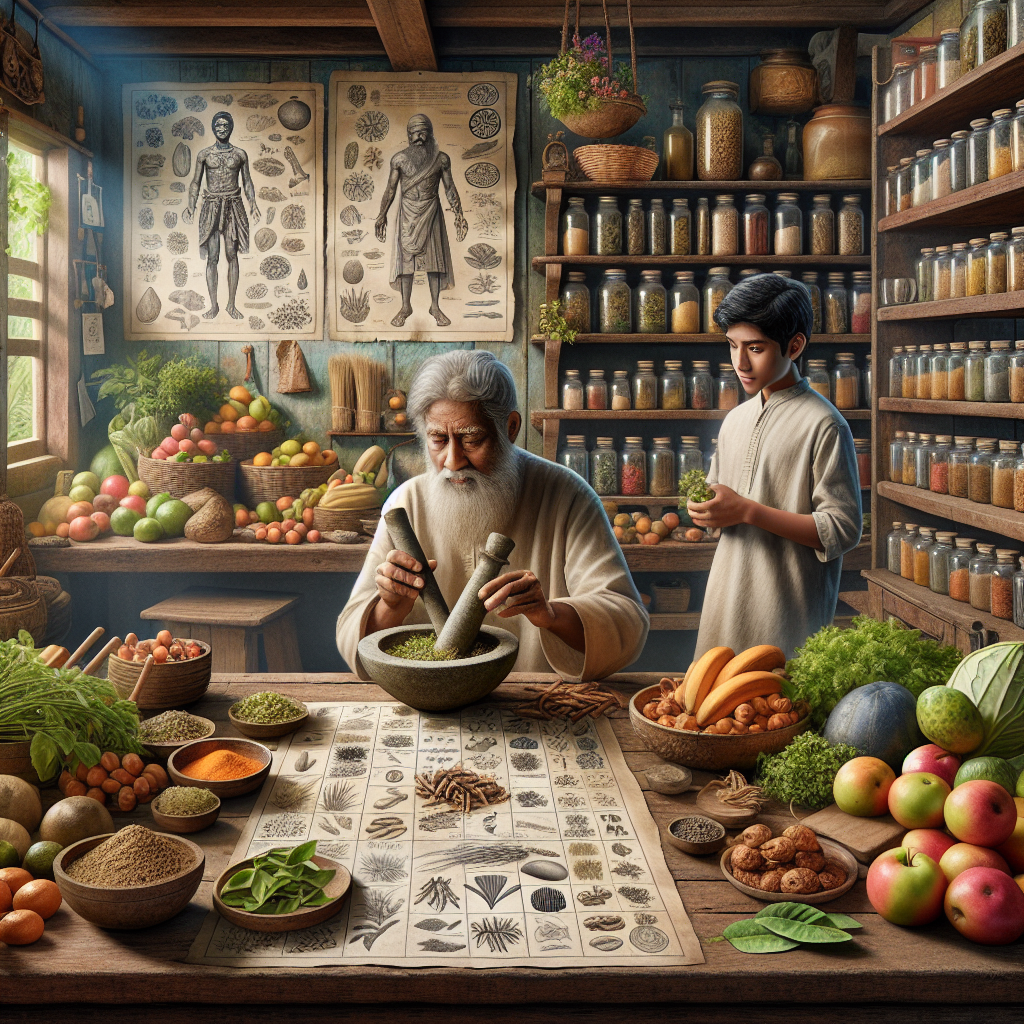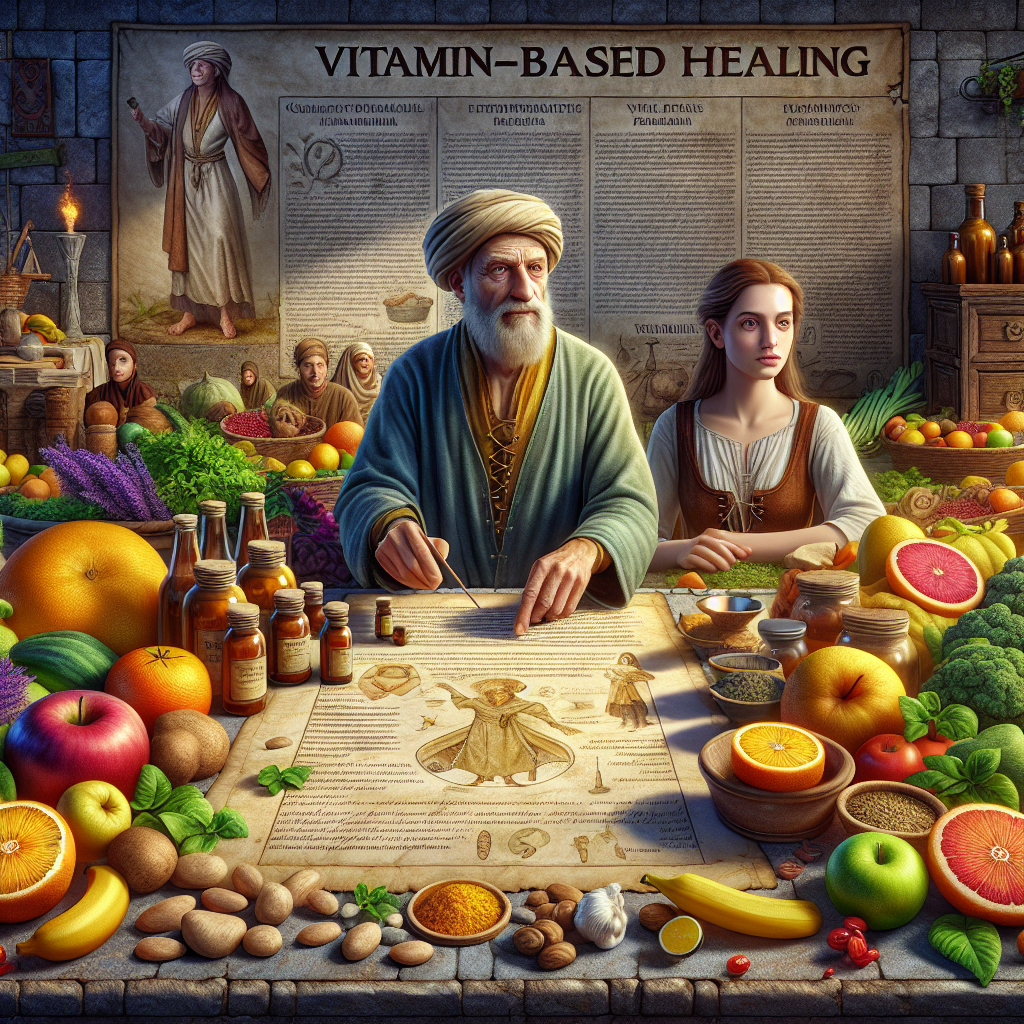Ancient Practices in Vitamin-Based Healing

Discover the secrets of ancient practices in vitamin-based healing! Uncover the wisdom of our ancestors and learn how to incorporate these time-tested methods into your modern lifestyle for optimal health. Visit My Vibrant Vitality now to start your journey towards a healthier you.
Exploring the Role of Vitamins in Ancient Healing Techniques
The ancient world was a treasure trove of knowledge and wisdom, particularly in the realm of health and wellness. Long before the advent of modern medicine, our ancestors had a profound understanding of the human body and its needs. One of the most fascinating aspects of this ancient wisdom is the role of vitamins in healing.
Vitamins, as we understand them today, are organic compounds that our bodies need in small amounts for normal growth and development. While the concept of vitamins as we know it did not exist in ancient times, the understanding of the importance of certain foods for health and healing was certainly present.
In ancient Egypt, for instance, liver was often prescribed as a cure for night blindness. Today, we know that night blindness is often caused by a deficiency in vitamin A, which is abundant in liver. Similarly, in ancient Greece, citrus fruits were recommended for sailors to prevent scurvy during long sea voyages. This practice was based on the understanding that these fruits could prevent the disease, which we now know is caused by a deficiency in vitamin C.
In the East, traditional Chinese medicine and Ayurveda, the ancient Indian system of medicine, also recognized the importance of a balanced diet for maintaining health and treating diseases. These systems emphasized the consumption of a variety of foods, including fruits, vegetables, grains, and animal products, to ensure a balanced intake of what we now identify as essential vitamins and minerals.
The ancient Mayans, known for their advanced understanding of astronomy and mathematics, also had a sophisticated approach to health and nutrition. They recognized the importance of a balanced diet and used a variety of local plants and animals in their diet to ensure they received a wide range of nutrients. For example, they consumed a type of algae, which we now know is rich in B vitamins.
In Africa, traditional healers have long used the Moringa tree, often referred to as the “miracle tree,” for its numerous health benefits. Every part of the tree is edible and packed with vitamins and minerals. Today, Moringa is recognized as a superfood and is used worldwide for its nutritional benefits.
These examples illustrate that while the ancients may not have understood vitamins in the way we do today, they recognized the importance of a balanced diet and the role of certain foods in promoting health and healing. They observed the effects of these foods and incorporated them into their healing practices.
Today, as we continue to explore the role of vitamins in health and disease, we can draw on this ancient wisdom. Modern research is increasingly validating the importance of a balanced diet rich in vitamins for maintaining health and preventing disease.
In conclusion, the ancient practices in vitamin-based healing underscore the timeless wisdom of a balanced diet. They remind us that while our understanding of nutrition has evolved, the fundamental principles remain the same. As we continue to explore the complexities of human health, we would do well to remember the wisdom of our ancestors and the importance they placed on the healing power of food.
The Influence of Vitamin-Based Remedies in Ancient Medicine

The influence of vitamin-based remedies in ancient medicine is a fascinating topic that sheds light on the wisdom of our ancestors and their understanding of the human body. The ancient practices in vitamin-based healing were not only innovative but also remarkably effective, considering the limited scientific knowledge available at the time.
The concept of vitamins as we understand it today did not exist in ancient times. However, the ancients had a profound understanding of the healing properties of certain foods, which we now know to be rich in essential vitamins and minerals. They recognized the importance of a balanced diet and the role of specific foods in maintaining health and treating diseases.
For instance, the ancient Egyptians were known to consume liver, a rich source of Vitamin A, to combat night blindness. Similarly, the Greeks and Romans recognized the importance of citrus fruits in preventing scurvy, a disease we now know is caused by Vitamin C deficiency. These practices demonstrate an intuitive understanding of the role of vitamins in health and disease, long before the advent of modern nutritional science.
In ancient India, the practice of Ayurveda, a holistic healing system that dates back over 3,000 years, emphasized the importance of a balanced diet for overall health. Ayurvedic practitioners prescribed specific foods for their healing properties, many of which are rich in essential vitamins and minerals. For example, they recommended turmeric, a potent source of Vitamin C, for its anti-inflammatory and antioxidant properties.
Similarly, in traditional Chinese medicine, which has a history of over 2,000 years, food and herbs were used as medicine. The Chinese believed in the concept of ‘food therapy’, where specific foods were used to balance the body’s energy, or ‘qi’, and to treat specific ailments. Many of these foods, such as goji berries, a rich source of Vitamin A and C, and ginger, high in Vitamin B6, are now recognized for their nutritional and medicinal properties.
In the Americas, the indigenous peoples also had a deep understanding of the healing properties of plants and foods. They used berries, rich in Vitamin C, to prevent and treat scurvy, and corn, a good source of niacin (Vitamin B3), to maintain skin health. These practices highlight the indigenous peoples’ knowledge of the role of vitamins in health and healing.
The ancient practices in vitamin-based healing have had a profound influence on modern medicine. Today, we recognize the importance of vitamins in maintaining health and preventing disease. We understand that a deficiency in certain vitamins can lead to specific diseases, and we use vitamin supplements to treat these deficiencies.
However, the wisdom of our ancestors reminds us that vitamins should not be isolated from their natural sources. The ancients did not have vitamin pills; they obtained their vitamins from a balanced diet of whole foods. This holistic approach to health and healing, which emphasizes the importance of a balanced diet, is a lesson we can learn from our ancestors.
In conclusion, the influence of vitamin-based remedies in ancient medicine is a testament to the wisdom of our ancestors. Their intuitive understanding of the healing properties of foods, and their use of these foods to maintain health and treat disease, is a practice that continues to inform modern medicine. As we continue to explore the role of vitamins in health and healing, we would do well to remember the wisdom of our ancestors and the importance of a balanced diet.
Unveiling the Secrets of Ancient Vitamin-Based Healing Practices
The ancient world, with its myriad of cultures and civilizations, has left us a rich legacy of knowledge and wisdom. Among these treasures, the practices of vitamin-based healing stand out as a testament to the ingenuity and resourcefulness of our ancestors. These practices, which have been passed down through generations, offer a fascinating glimpse into the past and provide valuable insights for modern medicine.
The concept of vitamins as we understand it today did not exist in ancient times. However, our ancestors had an intuitive understanding of the importance of certain foods for health and well-being. They recognized that certain foods could prevent or cure specific ailments, and they incorporated these foods into their diets and healing practices.
For instance, ancient Egyptians were known to consume liver, a rich source of vitamin A, to improve night vision. Similarly, the Greeks and Romans recognized the value of citrus fruits in preventing scurvy, a disease caused by vitamin C deficiency. These early civilizations may not have understood the science behind these practices, but they observed the effects and used this knowledge to their advantage.
In the East, traditional Chinese medicine and Ayurveda, the ancient Indian system of medicine, also incorporated vitamin-rich foods into their healing practices. These systems emphasized the importance of a balanced diet for maintaining health and preventing disease. They prescribed specific foods for different conditions, many of which are now known to be rich in certain vitamins. For example, goji berries, a staple in traditional Chinese medicine, are packed with vitamin C and antioxidants.
The ancient Mayans, Aztecs, and Incas also had a deep understanding of the healing properties of certain foods. They cultivated crops like maize, beans, and squash, which are rich in vitamins and minerals. These foods formed the basis of their diet and were used in various healing rituals.
Transitioning to the Middle Ages, the concept of ‘humors’ dominated medical thought. This theory proposed that the body was made up of four humors or fluids – blood, phlegm, yellow bile, and black bile. Illness was believed to result from an imbalance of these humors. While this theory may seem primitive by today’s standards, it emphasized the importance of diet in maintaining balance and health. Foods rich in certain vitamins were prescribed to restore balance and promote healing.
Fast forward to the 18th and 19th centuries, when the science of nutrition began to take shape. Scientists started to isolate and identify specific nutrients, including vitamins. This led to the discovery of the role of vitamins in preventing and curing diseases, validating the wisdom of ancient healing practices.
Today, we have a scientific understanding of vitamins and their role in health and disease. We know that vitamins are essential nutrients that our bodies need in small amounts to function properly. We also know that deficiencies in certain vitamins can lead to specific diseases. This knowledge has allowed us to develop targeted treatments and preventive strategies.
However, the wisdom of ancient vitamin-based healing practices remains relevant. These practices remind us of the importance of a balanced diet and the healing power of nature. They also inspire us to continue exploring and learning from the past, as we strive to improve health and well-being in the present and future.
In conclusion, the secrets of ancient vitamin-based healing practices offer a fascinating glimpse into the past and valuable insights for the future. They remind us that the quest for health and well-being is as old as humanity itself, and that nature provides us with an abundance of resources to achieve this goal.